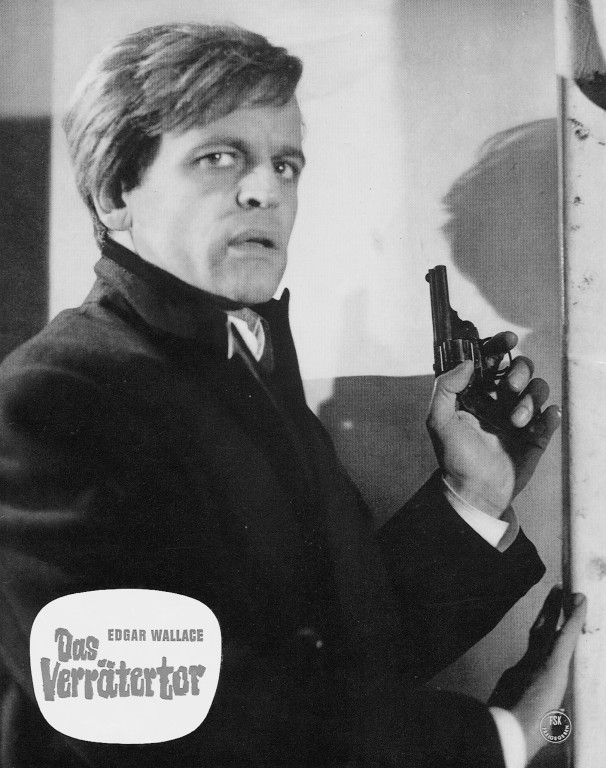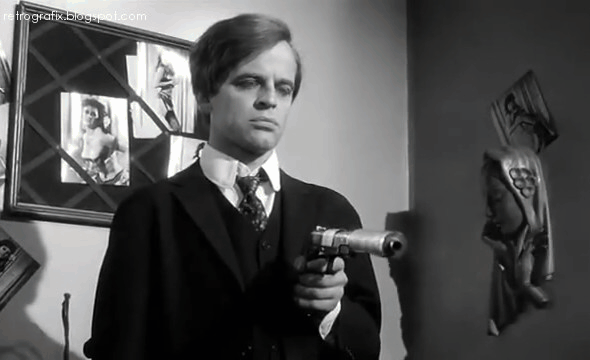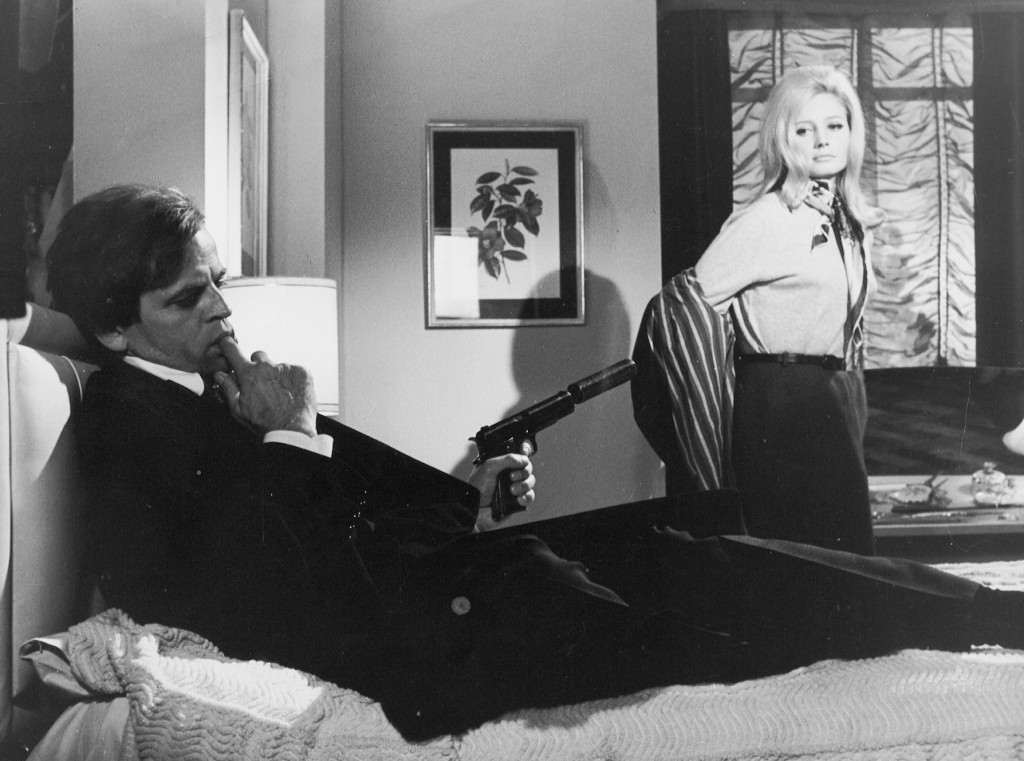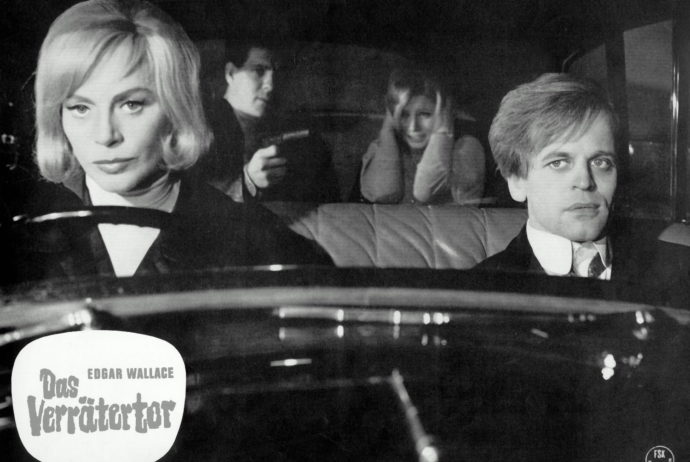Dir: Freddie Francis
Star: Gary Raymond, Albert Lieven, Margot Trooger, Klaus Kinski
 Bit of a surprise to see this is directed by Freddie Francis, an English film-maker, best known for his work as a cinematographer (winning Oscars almost three decades apart, for Sons and Lovers and Glory). As a director, in the sixties he was regularly employed by both Hammer and Amicus, helming Dracula Has Risen From the Grave, The Evil of Frankenstein and 1972’s Tales From the Crypt. Having once said, “Horror films have liked me more than I have liked horror films.” this movie is unusual, both in being German and a krimi, without any supernatural or horrific elements. The screenplay, similarly, was written by another Hammer horror veteran, Jimmy Sangster, based on Edgar Wallace’s
Bit of a surprise to see this is directed by Freddie Francis, an English film-maker, best known for his work as a cinematographer (winning Oscars almost three decades apart, for Sons and Lovers and Glory). As a director, in the sixties he was regularly employed by both Hammer and Amicus, helming Dracula Has Risen From the Grave, The Evil of Frankenstein and 1972’s Tales From the Crypt. Having once said, “Horror films have liked me more than I have liked horror films.” this movie is unusual, both in being German and a krimi, without any supernatural or horrific elements. The screenplay, similarly, was written by another Hammer horror veteran, Jimmy Sangster, based on Edgar Wallace’s
Instead, it’s a heist film, about a plan to steal the Crown Jewels from the Tower of London. It begins with a convict being broken out of Dartmoor prison by Kinski – the IMDb calls his character Kane, but at one point, his boss, Trayne (Lieven) clearly refers to him as Kinski! Said convict, Graham (Raymond) is key to the plan, because he is a dead-ringer for Dick (also played by Raymond, naturally), the man in charge of security at the Tower. So, the idea is to swap Graham for Dick, late one night, so that he can facilitate the entry of the thieves into the fortress, and also prevent the emergency power from being activated – triggering a power-cut to disable the security systems, is also part of the scheme. Meanwhile, comic relief German tourist Hector, played by krimi staple Eddi Arent, has stumbled across the plot, and when he can’t convince Scotland Yard of its seriousness, opts to investigate himself.
There’s quite a lot going on here, and not just in terms of the plot, but in terms of style and approach, with Francis not able to maintain a consistent tone, with some of the shifts between sequences not exactly smooth. A good example is Hector’s first scene, where he asks a street newspaper seller for directions to “unusual sights”, and ends up at a Soho strip-club. Blundering around there without his glasses, for humorous purposes, things turn unexpectedly dark, as he witnesses Kane’s cold-blooded killing of a man who tried to blackmail Trayne. What’s particularly memorable, and is shown below, is Kinski’s patient, yet slightly bored, expression, as he waits for the drum solo from the theater [this being from a time where strip-clubs had live music!], to cover up the sound of the gun going off. It’s some cold-hearted stuff, and quite at odds with Arent’s buffoonery. According to the IMDb, “International politics weighed heavily on the production of this movie, filmed at the height of the Cold War, and so to lighten the tension in the movie the German producers insisted on the inclusion” of Hector. To be honest, the latter adds nothing to the film, and I would have been happier if Sangster and Francis had stood their ground.

The rest of it isn’t bad, moving along at a decent pace, and with some nice set-pieces such as the robbers practicing their heist on a full-scale model of the room containing the jewels. There’s an Ocean’s 11 vibe to this aspect, and I’d like to have seen more of that. For this is clearly a large-scale operation – at one point, it’s mentioned that the proceeds are to be split between 25 different people, but the focus of the film is very much on the body-double section of the plan, and this may not be the most interesting. Certainly, there’s nothing particularly memorable about Dick as a character, though it is kinda weird to watch the “Beefeaters” who guard the Tower of London, spitting out their challenges in German! Unexpectedly, that almost gives the film a feel of an alternate history, like The Man in the High Castle.
Given the large roster of thieves, the way things unfold is probably not a surprise. The actual robbery goes off with surprising ease, and it’s only afterward that certain elements of the team take action, unsatisfied with their relatively paltry share of the estimated 1.5 million pound haul (somewhere north of 20 million in today’s money, though I’d say even that seems to underestimate the Crown Jewels’ value significantly). There’s no honor among this particular gang of thieves, particularly when the cops are hot on their trail – having finally realized that Hector was not some kind of loony. This leads to a climactic showdown on a boat heading out of British waters, with a bomb on board, courtesy of Trayne, and one final moment of ill-fitting light-heartedness, with Hector certain he had taken care of it. “Don’t worry. I defused the bomb,” he says, seconds before it explodes, wiping out the remainder of the robbers, along with who knows how many innocent merchant seaman. Who says Germans have no sense of humor?

